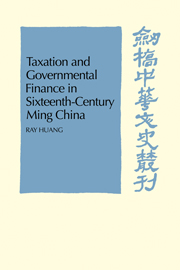Book contents
- Frontmatter
- Contents
- List of figures
- List of tables
- Preface by D. C. Twitchett
- Acknowledgements
- A note on weights and measures
- The Ming emperors
- Map of Ming provinces
- 1 Fiscal organization and general practices
- 2 The heritage of the sixteenth century and major fiscal problems
- 3 The land tax—(i) Tax structure
- 4 The land tax—(ii) Tax administration
- 5 The salt monopoly
- 6 Miscellaneous incomes
- 7 Financial management
- 8 Concluding observations
- List of abbreviations
- Appendixes
- Notes to the text
- Bibliography
- Glossary index
- General index
8 - Concluding observations
Published online by Cambridge University Press: 04 August 2010
- Frontmatter
- Contents
- List of figures
- List of tables
- Preface by D. C. Twitchett
- Acknowledgements
- A note on weights and measures
- The Ming emperors
- Map of Ming provinces
- 1 Fiscal organization and general practices
- 2 The heritage of the sixteenth century and major fiscal problems
- 3 The land tax—(i) Tax structure
- 4 The land tax—(ii) Tax administration
- 5 The salt monopoly
- 6 Miscellaneous incomes
- 7 Financial management
- 8 Concluding observations
- List of abbreviations
- Appendixes
- Notes to the text
- Bibliography
- Glossary index
- General index
Summary
The Ming empire remained non-competitive with other nations, militarily and economically; therefore it was not keenly concerned with administrative efficiency. Even when governmental institutions were degenerating, this seldom led to an immediate crisis, for the population exhibited remarkable tolerance of mismanagement. Unsatisfactory conditions could sometimes persist for decades or even for over a century without causing serious alarm. Furthermore, the ad hoc, piecemeal measures adopted to deal with problems had the tendency not to solve them, but to transfer them into other areas. For these reasons the institutional history of the Ming dynasty is extremely difficult to analyze. Earlier discussions of such matters as the manipulations of the currency, the management of the salt monopoly, and the administration of the wei-so system has provided many examples of such complexities. The case of army logistics is most illuminating. Having been neglected since the mid fifteenth century, it became a matter of genuine concern only 100 years later. When a solution was devised, it did not involve reorganization of the armed forces, but further increases of the land taxes.
Obviously, most historical problems have deep roots. The constitutional crisis in Stuart England cannot be understood without reference to the Tudor Reformation, and it is only comparatively recently that historians have established that the foundations of Meiji Japan were in fact laid during the late Tokugawa period.
- Type
- Chapter
- Information
- Publisher: Cambridge University PressPrint publication year: 1975



